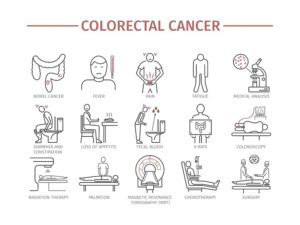Colorectal cancer affects over 130,000 people each year in the United States. In late stages, colon and rectal cancers can be very difficult to treat, and the prognosis to recovery is not optimistic. That’s why it’s important to ask your doctor for help detecting the signs of colon cancer. With early detection, however, more treatments are available, including surgery to remove active tumors.
People often overlook colon cancer symptoms. Especially because people usually dismiss changes to their bodies as signs of aging or basic digestive system upset. However, catching cancer early can make the difference for recovery. Learn more about early signs of colon cancer and how early detection can create more treatment options.
Signs and Symptoms
The early stages of colon cancer often start with pre-cancerous growths inside the colon called polyps. These often have no symptoms, but doctors can see them on routine colon screenings, which experts recommend to everyone over the age of 50.
If you have a history of cancer in your family, especially for people who are young, your doctor might recommend that you begin screening earlier.
Sometimes, however, colon cancer is a simple, large tumor that grows in the large intestine that starts to block off portions of the colon as it grows. This type of tumor is usually very slow to develop, so symptoms will also come slowly over time. The most telling symptoms of colon cancer are:
- Blood in the stool. Cancerous tumors are vascular and they can bleed as stool moves past them.
- Pain when going to the bathroom or pain in the lower abdomen. You might write off this pain as general muscle soreness.
- Stool changes. The presence of tumors in the abdomen can narrow the pathway for stools, so they are narrower than they should be. Persistently narrow stools combined with other symptoms warrants investigation.
- Weight loss. People with colon cancer begin to lose weight without diet or exercise.
- Low iron. You might become anemic as colon cancer starts to grow. Tumors in the colon bleed slowly. The steady blood loss makes recouping the iron loss difficult for your body. You might be anemic if you feel tired all the time, if you have trouble concentrating, and feel cold in your hands and feet.
Don’t be afraid to speak with your doctor about your symptoms. Less serious problems could cause these symptoms, but colon cancer is very treatable through surgery if you are able to catch it before it spreads to other organs.
Screening and Diagnosis
 Your doctor can screen for cancer with routine colonoscopy. A colonoscopy can find developing polyps. If you have polyps, you know your risk for developing colon cancer increases, so you can be more on your guard for other symptoms. Seniors should especially make sure to schedule regular colonoscopy.
Your doctor can screen for cancer with routine colonoscopy. A colonoscopy can find developing polyps. If you have polyps, you know your risk for developing colon cancer increases, so you can be more on your guard for other symptoms. Seniors should especially make sure to schedule regular colonoscopy.
If you are anemic and have pain and stool changes, you might request a colonoscopy and blood tests to help confirm colon cancer. Once diagnosed, your doctor will discuss surgical options with you, since many people with colon cancer need surgery for effective colon cancer treatment.
Surgery and Treatment
Many differing types of surgeries exist to treat colon cancer. The type of surgery will depend on how advanced your cancer is and what the prognosis will be. Common procedures include the following.
Polypectomy
This is the least invasive surgery option and is the best way to prevent cancer from getting worse. During a colonoscopy, if the technician finds polyps, they can remove them with a live electric wire loop that cuts the polyp off the colon wall.
Polyp Excision
In cases why polyps have grown larger or when they start to become cancerous, you might need an excision to remove the polyp and a small portion of the colon tissue where the polyp was present. A doctor can also do this procedure during the colonoscopy.
Partial Colectomy
When a tumor has grown in the colon, smaller procedures are not suitable. You might need to remove a portion of the colon in order to also remove all the cancer cells of the tumor. The doctor removes a section of the colon and attaches the remaining sections together.
Two methods exist to perform a colectomy. You can have laparoscopic surgery, which uses only small incisions in the abdomen. The surgeon uses cameras to excise the tumor and remove the affected colon tissue. This surgery is less traumatic for the patient, so the recovery is much easier.
However, sometimes choosing an open colectomy is safer, which allows the surgeon to access the colon through a larger abdominal incision, simply because this surgery is more routine than newer laparoscopic technology.
Colostomy
If the tumor has caused bowel blockage and the patient is quite ill as a result, surgery to remove a tumor might not be possible yet.
Instead, the patient might first need a colostomy, which allows the bowel to drain through a stent externally into a bag with the hope of removing the tumor surgically later after the patient recovers.
If you do not catch cancer early enough, surgery on the colon might not be possible or surgical treatment might only extend the time you have left. Pay attention to symptoms and signs of colon cancer. Then carefully follow screening recommendations so you can better fight colon cancer.
For more information, contact us at The Surgical Clinic.
SURGEONS WHO PERFORM COLORECTAL SURGERY
- Brent Fruin, MD, Summit Clinic
- Richard J. Geer, MD, FACS Downtown Clinic
- Trudie Goers, MD, FACS, Downtown Clinic
- Bassam Helou, MD, Downton Clinic
- Dr. Clinton Marlar, MD, FACS, Skyline
- James G. McDowell, MD, FACS, Downtown Clinic
- Willie V. Melvin III, MD, FACS, Smyrna Clinic, TSC Rutherford
- William H. Polk, MD, FACS, Downtown Clinic
- Drew H. Reynolds, MD, FACS, St. Thomas West Clinic
- Joshua T. Taylor, MD, The Surgical Clinic – Rutherford and Murfreesboro
- Patrick S. Wolf, MD, FACS St. Thomas West Clinic
General surgeons in Greater Nashville

Dr. John Boskind
General Surgeon
SUMMIT

Dr. Mariana Chavez
General Surgeon
Downtown

Dr. Patrick Davis
General Surgeon
SOUTHERN HILLS

Dr. Gretchen Edwards
General Surgeon
DOWNTOWN

Dr. Alex Fruin
General Surgeon
SUMMIT

Dr. James Griscom
General Surgeon
NASHVILLE

Dr. Mark Hinson
General Surgeon
COLUMBIA

Dr. George Lynch
General Surgeon
NASHVILLE

Dr. Clinton Marlar
General Surgeon
SKYLINE

Dr. Willie Melvin
General Surgeon
SMYRNA

Dr. Chad Moss
General Surgeon
COLUMBIA

Dr. William Polk
General Surgeon
NASHVILLE

Dr. Drew Reynolds
General Surgeon
ST. THOMAS WEST

Dr. Joshua Taylor
General Surgeon
SMYRNA

Dr. Davidson Oxley
General Surgeon
COLUMBIA

Dr. Tyson Thomas
General Surgeon
ST. THOMAS WEST

Dr. John Valentine
General Surgeon
HENDERSONVILLE

Dr. Patrick Wolf
General Surgeon
ST. THOMAS WOLF

